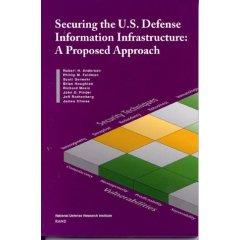| 2020ok Directory of FREE Online Books and FREE eBooks |
Free eBooks > Science > Mathematics > History > Securing The U.s. Defense Information Infrastructure: A Proposed Approach
Securing The U.s. Defense Information Infrastructure: A Proposed Approachby Robert H. Anderson  Download Book (Respecting the intellectual property of others is utmost important to us, we make every effort to make sure we only link to legitimate sites, such as those sites owned by authors and publishers. If you have any questions about these links, please contact us.) link 1 About Book Book Description It is widely believed, and increasingly documented, that the United States is vulnerable to various types of information warfare attacks. Threats range from nuisance attacks by hackers to those potentially putting national security at risk. The latter might include attacks on essential U.S. information systems in a major regional crisis or theater war. The purpose might be to deter (or coerce) a U.S. intervention, to degrade U.S. power projection capabilities, to punish the United States or its allies, or to undermine the support of the American public for the conflict. From the Publisher This report addresses the survivability and assured availability of essentialU.S. information infrastructures, especially when they areunder various forms of "information warfare" attack. To the best ofour knowledge, the term "minimum essential information infrastructure"(MEII) was coined by one of the authors (Mesic) as part of theplanning for a series of "Day After . . . in Cyberspace" informationwarfare exercises conducted from 1995 to the present under the directionof our RAND colleague Roger Molander. The idea is thatsome information infrastructures are so essential that they should begiven special attention, perhaps in the form of special hardening, redundancy,rapid recovery, or other protection or recovery mechanisms.Players in the "Day After . . ." exercises were intrigued by the MEIIconcept but asked: Is this concept feasible? Is it practical? For whatportions of the Department of Defense and U.S. infrastructure is theconcept relevant? What would such infrastructures look like? Howeffective or useful would they be? This report documents the findingsof the first year of a study of the MEII concept, attempting toformulate some initial answers to these questions-or, if these arenot the right questions, to ask and answer better ones. This reportshould be of interest to persons responsible for assuring the reliabilityand availability of essential information systems throughout theU.S. defense establishment, the U.S. critical infrastructure, and otherorganizations. Its findings and recommendations are relevant at allorganizational levels, from small units to major commands.This study is sponsored by the National Security Agency, the DefenseAdvanced Research Projects Agency, and the Office of the AssistantSecretary of Defense (Command, Control, Communications, andIntelligence). It is being conducted in the Acquisition and TechnologyPolicy Center of RAND's National Defense Research Institute, afederally funded research and development center (FFRDC) sponsoredby the Office of the Secretary of Defense, the Joint Staff, theunified commands, and the defense agencies. Please direct anycomments on this report to the project leader,Robert H. Anderson(310) 393-0411 x7597Robert_Anderson@rand.orgor to the director of the Acquisition and Technology Policy Center,Eugene C. Gritton(310) 393-0411 x7010Gene_Gritton@rand.org About the Author Robert H. Anderson (Ph.D., Applied Mathematics, Harvard University) is a Senior Information Scientist at RAND. Research areas include social implications of the information revolution; security and safety of internetted networks; computer languages and support environments for modeling and simulation; human-computer interface; use of computers for C3I and defense Phillip Feldman (PhD, Electrical Engineering, University of Southern California) is a Senior Engineer at RAND. Research interests include performance and survivability of information systems, military use of commercial technology, circuit-switched and packet-switched networks, communications satellites, telecommunications and computer networks, throughput/delay analyses, communications link design and analysis, and electronic warfare. Scott Andrew Gerwehr (PhD, International Relations, University of California Los Angeles; PhD Program RAND Graduate School of Policy Analysis, Santa Monica, CA) is a Political Scientist at RAND. Research interests include Deception/Counterdeception in the areas of Social & Cognitive Psychology, Biology & Animal Behavior, Organized Crime, Confidence Artists, Politics & International Relations, Military History, Terrorism, Insurgency, and Guerrilla Warfare. RICHARD MESIC (M.S., D.A.G.S., Probability and Statistics, Michigan State University) is a RAND senior staff member, Defense Planning and Analysis Department. Jeff Rothenberg (M.S., Computer Sciences, University of Wisconsin) is a Senior Computer Scientist at RAND. Research Interests include the impact of information technology on record-keeping and developing ways of ensuring the longevity of digital records and documents. The fundamental nature of modeling and developing a theory of modeling as a primary cognitive activity. Issues of data quality and techniques for evaluating and recording the quality of data. Using advanced modeling, AI and simulation for decision support, emphasizing end-user interaction and clarity of representation. James Chiesa (M.S., Environmental Science , Indiana University; M.A., Zoology , Indiana University) is a Communications Analyst at RAND. Related Free eBooks
| Related Tags |












SEND A COMMENT
PLEASE READ: All comments must be approved before appearing in the thread; time and space constraints prevent all comments from appearing. We will only approve comments that are directly related to the article, use appropriate language and are not attacking the comments of others.